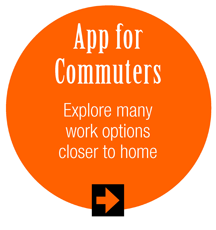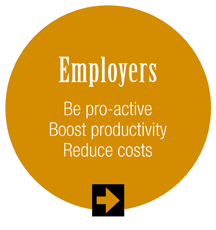Welcome to the test site for Closer Commutes.
Our main website is at www.closercommutes.org
We use this closecommute.com website to prototype web apps, toolkit components and marketing materials. Feel free to poke around, learn about how the daily commutes of thousands of workers will be shortened when employers modernize key human resources practices. Delve into our research. The web app component of this site is not being monitored on a daily basis. You can contact us at closecommute@gmail.com or by phone at 250-380-0998 (Pacific Time)... -- thanks, cheers, Bruce
Our main website is at www.closercommutes.org.
Closer commutes are a huge win for workers,
their employers, the economy, society and Mother Nature. Together we can
make this happen soon, using remarkably simple solutions.
Closer Commutes is a global initiative to radically reduce commuting times and distances - starting in BC
Our five-year goal is to save commuters billions of hours annually while boosting productivity and lowering HR costs, decreasing traffic congestion and pollution, lowering health-care costs, and strengthening regional economies. Fixing the existing totally-inefficient situation will also reduce greenhouse gas emissions by over one per cent globally.
- The initial phase has focused on research and development of the HR toolkit. We interviewed over one hundred contacts (a "key informant survey") in industry, government, academia, unions, transportation agencies, and many long commuters as well. We developed and tested a webapp for commuters. We developed and tested a spreadsheet app that can to used by an employer to calculate the total annual employee commuting emissions (the "burden") and assess potential for a range of commute-reducing/greening tactics.
- With key people across government and PSOs (public service organizations/agencies) we have been drafting plans for a commute trip reduction (CTR) initiative participation in which would be mandatory for all medium and large BC employers, across all sectors.
- Once we have a BC roll-out happening, we will work with other jurisdictions in Canada and beyond.
The basic processes/tactics – for commuters and their employers – are simple to understand and implement. For example, the closercommutes (aka proximate commute) tactics calls on an employer to: Allow and encourage long commuters to switch workplaces with someone doing the same job at a different location so both can work closer to their homes. An organization will also update their human resources practices to consider candidates' commuting situation when hiring and for internal transfers.
The impact from this one tactic will be awesome — a trial with a US bank demonstrated that a multi-worksite organization can expect to reduce its total employee commuting burden by around 15 to 20 per cent within 15 months. As implementation of this closercommutes tactic and other proven tactics spreads to all multiple-worksite employers, we predict a five to 10 per cent reduction in total daily vehicular traffic across each metro region.
Everyone benefits when we become more efficient
- For long commuters: More quality time each day; lower stress and improved health; reduced commuting costs.
- For employers: Reduced costs for absenteeism, hiring, training and extended health benefits; higher productivity; happier employees.
- For society and the environment: hundreds of millions in regional economic benefits; reduced traffic load; faster commercial deliveries due to reduced congestion; less pollution and greenhouse gas emissions.
How we'll change a messed-up situation – with your help
CloseCommute Systems Inc. is a B.C.-based benefit corporation that is developing the initiative blueprint and employer implementation toolkit to trigger this paradigm shift:
Our analysis of employee-commuting data for RBC Royal Bank of Canada confirms that our overall plan is realistic, and our projections for traffic reductions are plausible. Roughly 75 per cent of the bank’s employees commute longer than appears necessary. For more than half of the employees, there is at least one staff member doing the same job at a different bank branch who could immediately swap locations for mutual benefit, not to mention the benefit to the bank and society in general — at no cost to the bank. We're examining data for other occupations, including teachers, municipal employees and health-care workers to confirm the situation is similar in other sectors.
CloseCommute has assembled an extensive annotated bibliography of peer-reviewed research into the effects of long commuting. It is sobering reading, and a call for action by everyone. Download The Effects of Long Commutes and What To Do About Them - An Annotated Bibliography from our research page.
We commissioned from Statistics Canada custom cross-tabulated data on commuting broken down by occupation; gender; daily commuting time (by 10-minute intervals); census subdivision; commuting flow patterns; and mode of transportation. This is the most complete and detailed cross-tabulated dataset ever produced Canada's four largest Metro Census Areas. We are providing this information at no charge to transit planners, employers, academics, labour unions and the public. Currently transportation planners and researchers at universities across Canada are examining the dataset. One example from the census data: In Vancouver, five out of every six teachers are commuting farther than necessary. If we could rectify that colossal waste of time and stress on teachers, imagine how the classroom experience might be improved! With the added workload and stress from the pandemic, what a gift it will be to allow teachers, health workers and other frontline workers to have shorter, healthier commutes.
We are discussing a commute trip reduction initiative program with BC politicians and ministry executives. If you have contacts to suggest or expertise to offer, please email Bruce Batchelor at closecommute@gmail.com or phone 250-380-0998 (Pacific Time).
Want to be in the loop?
Sign up for our regular emails. Spreading the word will benefit everyone. CAUTION: we rarely use this mailing list - so you might get more frequent updates by signing the change.org petition - use the link from our closercommutes.org homepage.
Are you an employer?
See our HR consulting page to obtain draft toolkit components as they become available, and other resources for implementing a commute trip reduction program.
Research indicates that adopting Closer Commutes best practices will boost operational productivity and lower your costs for hiring, training, extended health-care benefits, tardiness, absenteeism and more. Your organization also may be creating carbon tax offsets by cutting greenhouse gas emissions.
Thanks for joining this global movement
Together we will increase efficiency and reduce wasted time, expenses, traffic congestion and carbon emissions. We are aiming to reduce overall commuting traffic in targeted metro areas by 5% to 10% within two years, at no cost and with huge benefits to commuters, employers, society & the environment. It's a win-win-win-win situation.
The sooner everyone learns about and gets on board with the CloserCommutes approach, the sooner the benefits will kick in. Let's go!
Want to try the 2017 prototype web app to shorten your commute? Click/tap HERE
Total number of commuting hours they are working to reduce per year 6438 hrs
Total distance travelled they want to reduce per year 161421 Km
Total greenhouse gases they are working to decrease per year 190 Metric Tonnes of CO2 Equivalent





